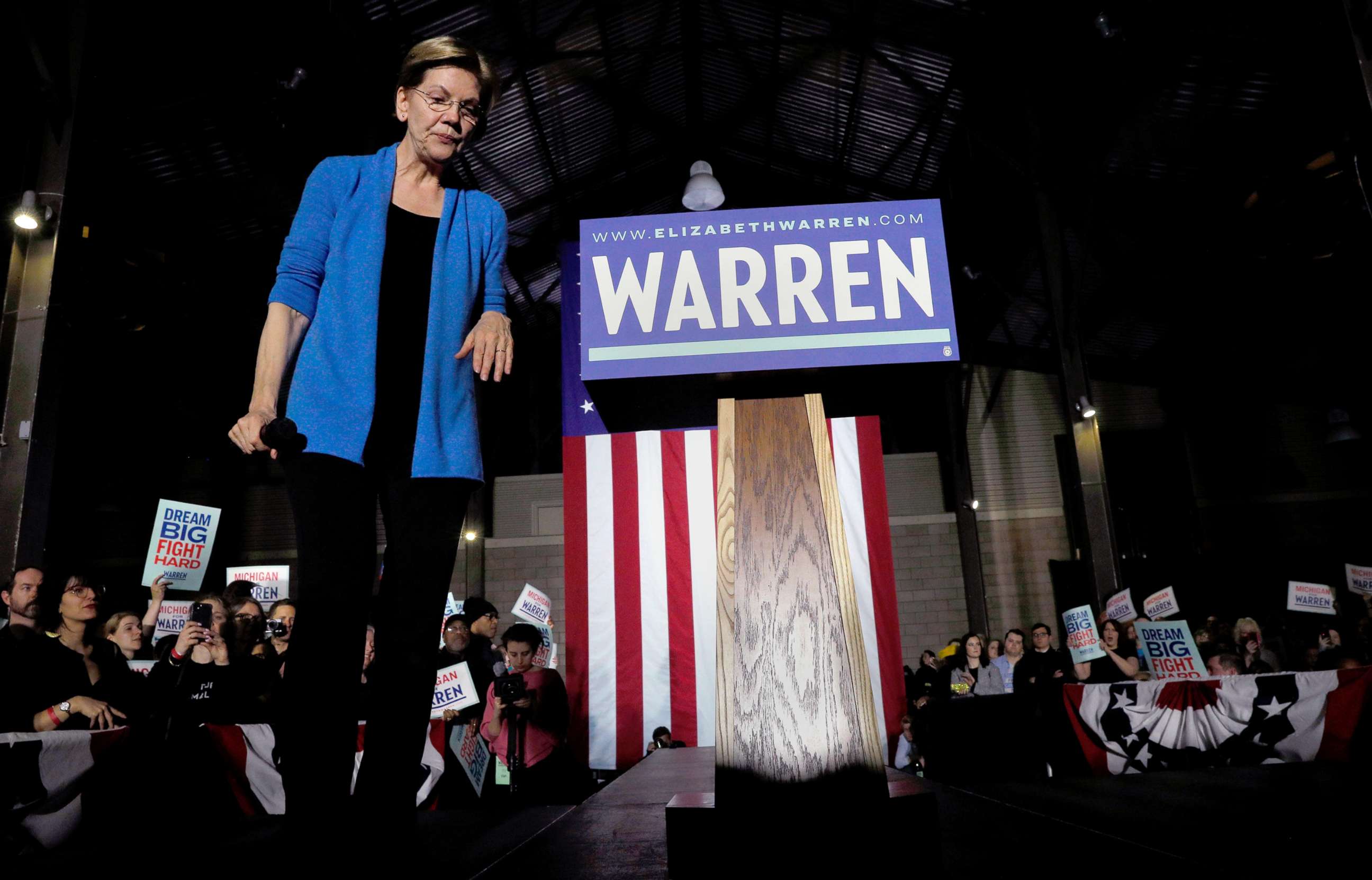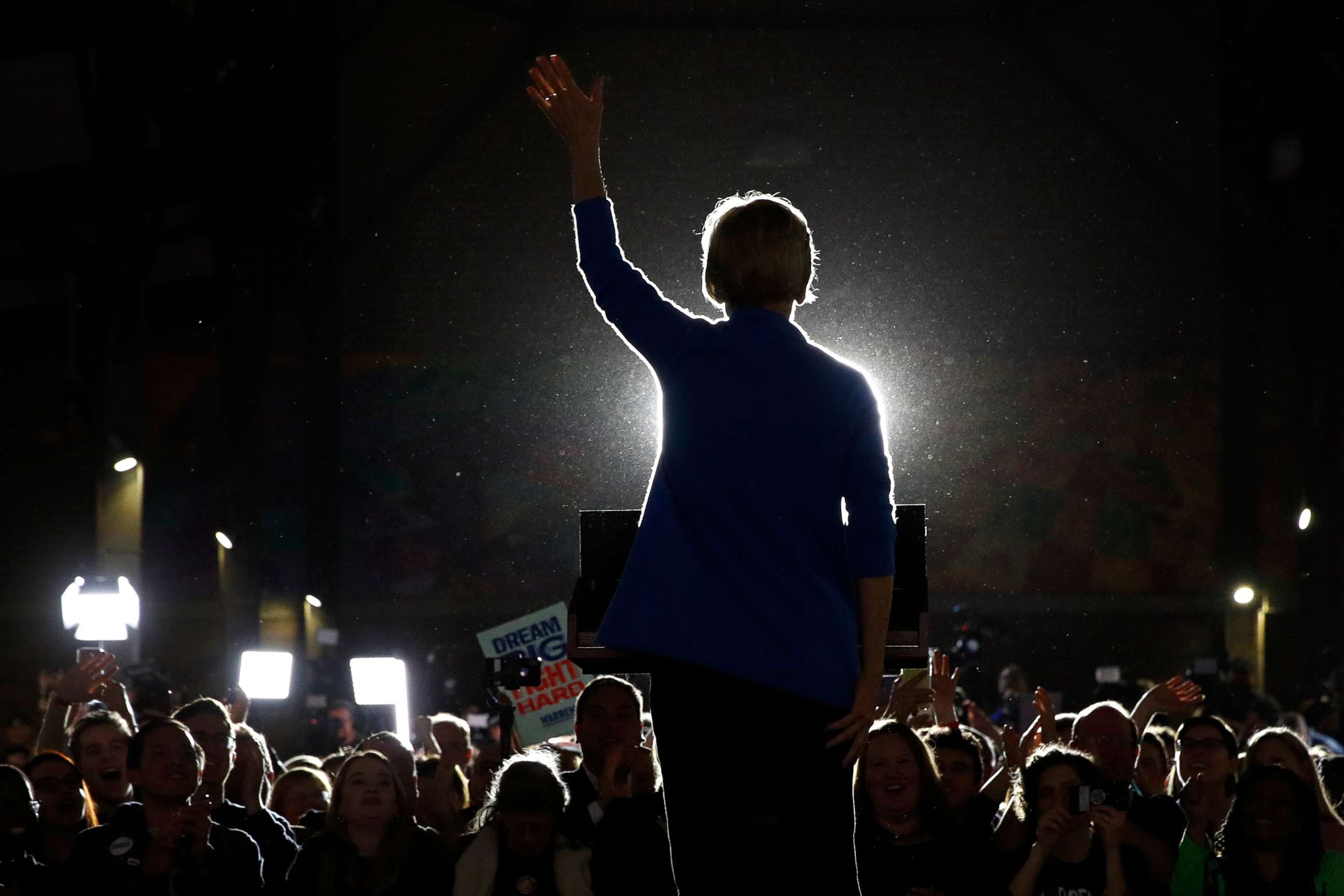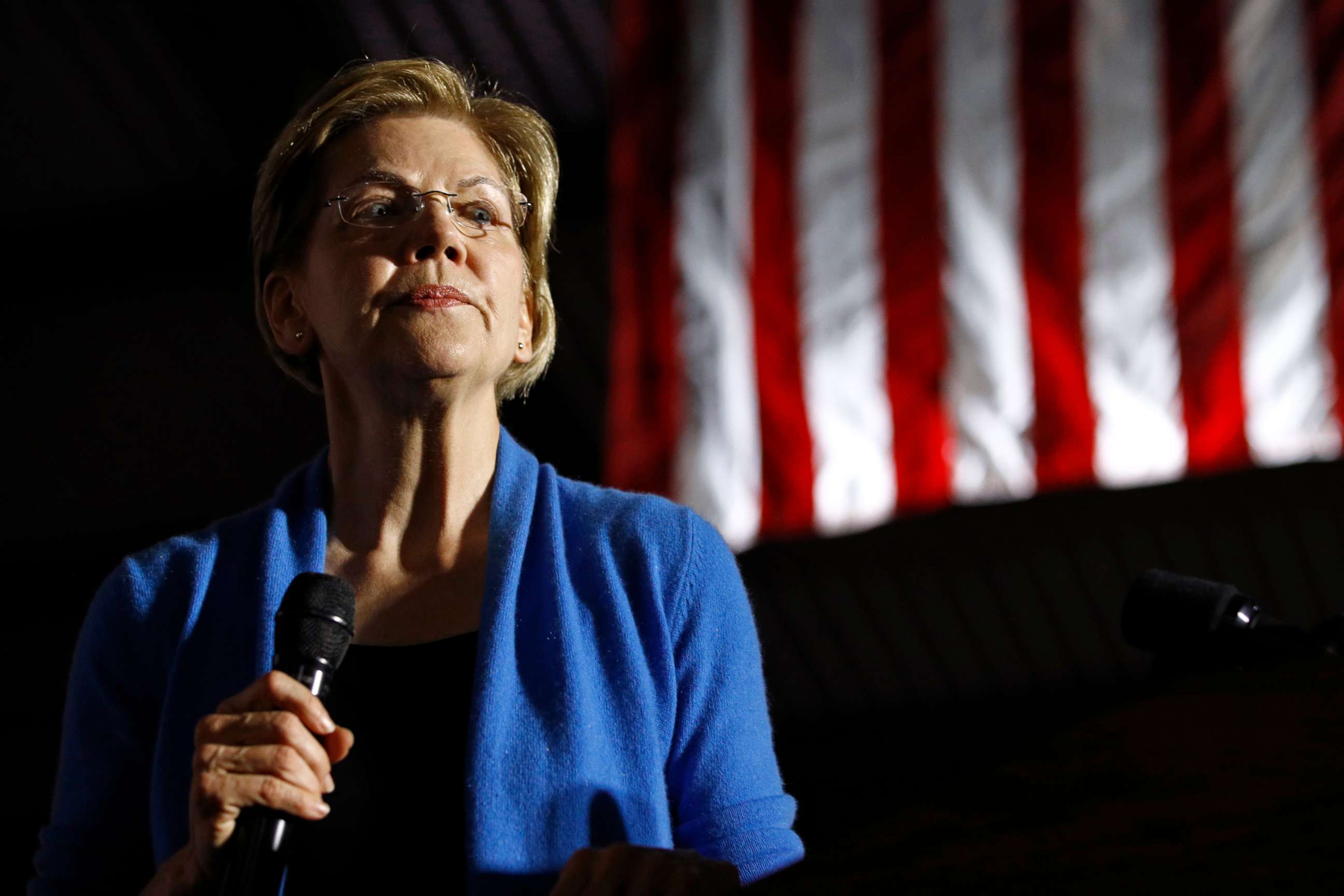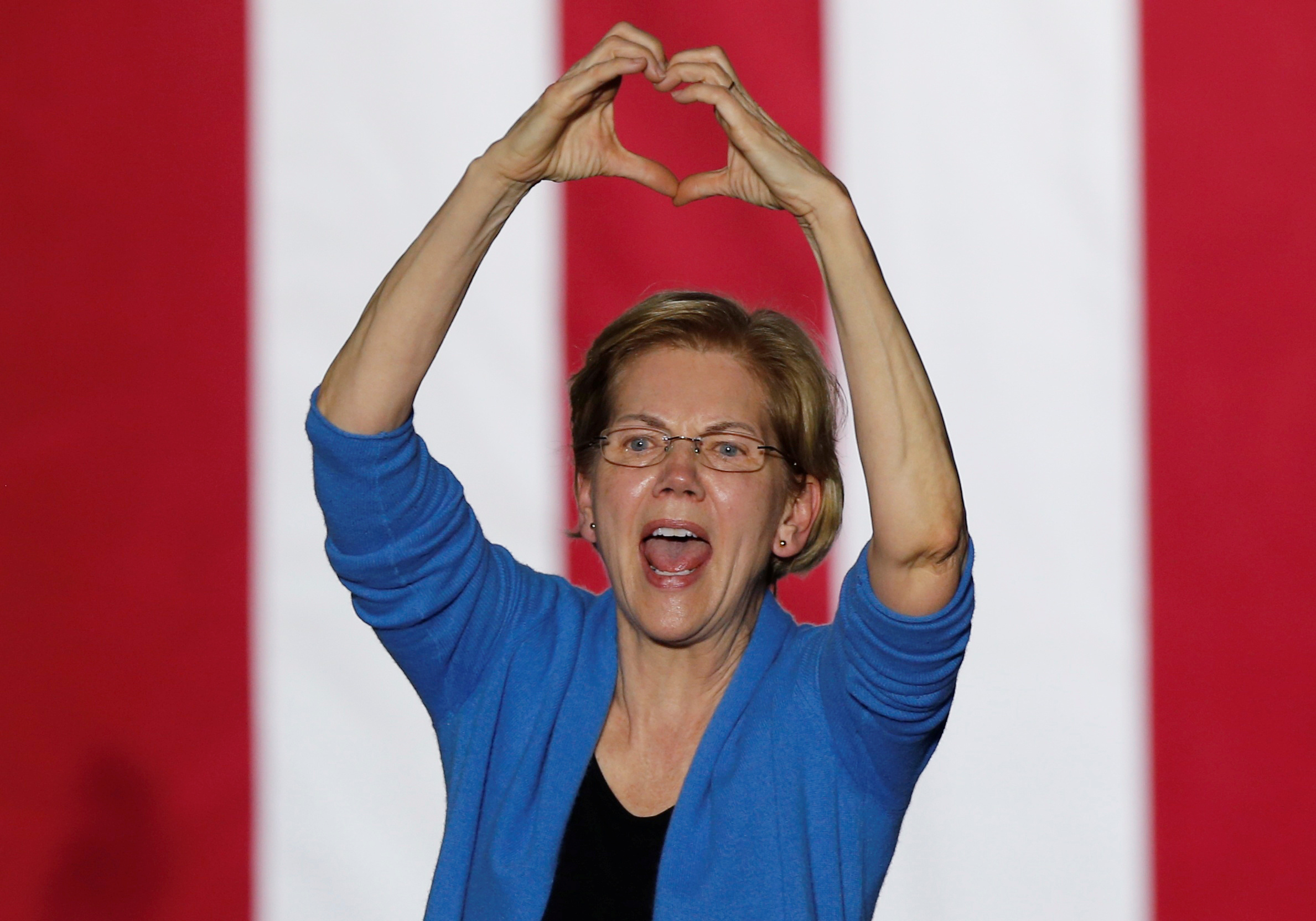Sen. Elizabeth Warren suspends her presidential run
She needs "space" to decide and declined to endorse Biden or Sanders Thursday.
Sen. Elizabeth Warren of Massachusetts, the progressive candidate who ran against corruption and pumped out more than 50 policy proposals during her campaign, suspended her presidential bid on Thursday.
"I will not be running for president in 2020. But I guarantee I will stay in the fight for the hard-working folks across the country who've got the short end of the stick, over and over," she told reporters at a media availability in Cambridge, Massachusetts on Thursday.
Warren, who was the last remaining woman candidate in the top tier, declined, when asked by reporters to endorse as the race now narrows to two men as front-runners, former Vice President Joe Biden and Vermont Sen. Bernie Sanders.
"I need some space around this and want to take a little time to think a little more," she said.
When asked by reporters what she would say to women and girls who feel as if they're left with choosing only between white men for president, Warren acknowledged that part is especially tough.
"One of the hardest parts of this is all those pinky promises," she said. "And all those little girls who are going to have to wait four more years. That’s going to be hard."
Warren's decision came on the heels of lackluster finishes on Super Tuesday -- including in her home state -- and in all four early states, despite putting boots on the ground earlier than most campaigns and touting one of the most organized campaigns. Her best finish was in Iowa, where she came in third. She came in fourth in New Hampshire, which neighbors her home state of Massachusetts, fourth in Nevada and fifth in South Carolina.
After Americans cast their ballots in February, Warren began to pitch herself as the middle ground between Sanders, a progressive, and Biden a moderate. She staked her strategy on sticking around for the "long haul," picking up the supporters of candidates who dropped out before her.

Warren was one of the first candidates to announce her 2020 bid, touching down in Iowa for an exploratory trip in January of 2019 — more than a year before the caucuses. She officially announced her campaign in February, 2019, from Lawrence, Mass., before a crowd of around 3,500, per campaign estimates.
Her campaign quickly became known for its meticulous branding.
“I have a plan for that,” one of Warren’s tag lines, directly referred to her campaign’s rapid-fire policy announcements — but also applied to her team’s consistency.
Her staff operated a “selfie line” at nearly every single rally, developing an assembly-line like system that allowed Warren to meet every voter who wanted to stay after the event. At her largest rallies, the lines lasted for four or five hours. Warren also took questions from the press nearly every single day on the trail, drawing a marked contrast to Sanders and Biden, who sometimes went months without holding a media availability.

Her key policies all formed around her message of anti-corruption.
"The good news is that I have the biggest anti-corruption plan since Watergate,” Warren often said in her stump speech. “The bad news is that we need the biggest anti-corruption plan since Watergate. These problems, this corruption, started long before Donald Trump became president."
Her platform rested on a 2% wealth tax on fortunes over $50 million, as well as a 6% wealth tax on fortunes over $1 billion. Warren pledged that the estimated $3.75 trillion raised from the tax would go toward investments in the next generation: universal child care, free tuition at public universities and the cancellation of student loan debt for 42 million Americans. Chants of "2-cents!" frequently broke out at her larger rallies.
The campaign had a rough start, however, beginning with a DNA test the senator took to address controversial claims of Native American heritage. Though the test was a response to Trump’s frequent taunts, the test was poorly received by tribes who said such tests don’t prove tribal citizenship.
Warren later apologized for taking the test and acknowledged her mistakes.

But her campaign picked up steam over the summer months as she neared and then surpassed Sen. Bernie Sanders, her progressive opponent, in the polls and in fundraising totals. In the span of a few weeks — which would come to mark the peak of her campaign — she drew 12,000 people at an event in St. Paul, Minn., 15,000 people in Seattle and 20,000 people in New York City, per campaign estimates.
Warren’s campaign revolved around the single issue of rooting out corruption. It was an issue that brought Warren into politics in the first place, after decades researching why American families went bankrupt and her introduction to Washington as creator of the Consumer Financial Protection Bureau in the aftermath of the financial crisis.
Warren extended her message of anti-corruption into a pitch to Americans that, she hoped, would appeal to Democrats, Independents and Republicans.
“Two of my brothers are Republicans. There's a lot we disagree on, but there's a whole lot we agree on. One big thing: They're furious that giant corporations making billions of dollars in profits are paying $0 in federal income taxes,” Warren often said on the campaign trail.
From the beginning of her campaign, she went after the wealthiest Americans and the most profitable industries with one policy proposal after another, banking on the prospect that there were more voters who would be mobilized by her argument than there were rich people who would disagree.

Warren, like Sanders, decided not to hold any closed-door fundraisers for her campaign, immediately prompting criticism that she would leave money on the table or, if elected the nominee, put the whole party at a disadvantage up against the Republican Party, which made no such pledge.
Warren’s campaign invested heavily in ground-game around the country, building the largest staff in Iowa and extending staff into Super Tuesday states well before the early states voted. In turn, her fundraising numbers swelled over the summer, a reflection of grassroots support.
Warren first saw her fundraising numbers decrease about a month before the Iowa caucuses — a reflection of dwindling support from voters. She also lost fundraising steam just before the caucuses, coming in $3.5 million short of her previous quarters’ haul.
The slow of funding came after much of Warren’s fall months on the campaign trail were spent in the political barrel of criticism from opponents.
Warren’s campaign, from its earliest stages, often dominated the 2020 policy arena, usually one of the first to come out with a lengthy plan on an issue — ultimately tying it back to corruption.
Setting that standard, however, posed a challenge to Warren — particularly when it came to health care, which she didn’t have her own plan to address.
Former South Bend, Indiana, Mayor Pete Buttigieg and former Vice President Joe Biden, both more moderate candidates in the race, led the charge in pointing out holes in Warren’s support for Medicare for All and for many weeks, Warren was asked by reporters how she planned to pay for the policy.
She eventually released a proposal to pay for Medicare for All without raising taxes "one penny" on the middle class, as well as a transition plan that walked back her support for Sanders' version and instead called for a public option for the first three years of her presidency.
The heat Warren took on health care coincided with a rise from Buttigieg in Iowa.
As the race picked up, Warren also faced tension with Sanders, despite a progressive pact that the two maintained until January, often telling reporters that they had a decades-long friendship and would let voters decide which candidate was best.
The breakdown of their progressive pact in January reflected the competitiveness of the race in the final months, as more voters came to the conclusion that only one progressive candidate could continue on through the early states to Super Tuesday.
Fellow current and former 2020 Democratic presidential candidates weighed in on Warren's tenacity as a politician and her efforts as a progressive-stalwart.
"Righteous words from a righteous woman. My friend. My partner in good. You have fought every single day for our families. This is a movement built to last. The Work continues. In this fight with you always @ewarren," Massachusetts Rep. Ayanna Pressley, who endorsed Warren tweeted.
Sanders lauded what he called Warren's "extraordinary campaign of ideas" while Biden called her "the fiercest of fighters for middle class families."
For her part, Warren, as she did throughout her bid vowed to supporters to continue to tackle systemic injustices that impact working families.
"We will persist."




